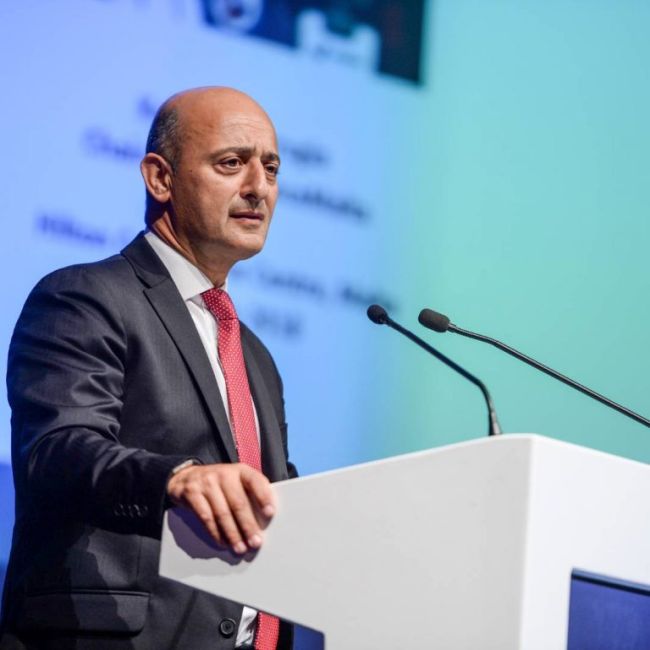Kenneth Farrugia was recently appointed as chief executive officer at Bank of Valletta plc. FinanceMalta caught up with its former chairman to discuss his vision

Photo – Kenneth Farrugia, CEO, Bank of Valletta
- What changes – if any – are you making to the Bank's strategy?
We are currently heading into the last year of our 3-year strategic plan where some of the existing strategic thrusts will also feature in the forthcoming strategic plan. Our core business areas and key enablers such as data and digital, as well as the creation of customer value will feature highly in our strategy.
When I look back over the years, technology has always played an important role in the Bank's development. Since its inception, just under 50 years ago, the Bank always positioned itself as a leader, innovator and economic catalyst. BOV was, in fact, first in the market with telephone banking and thereon also introducing internet and mobile banking, ATMs, debit and credit cards, brokerage business, asset management and servicing, among others.
Regulatory developments as well as technological evolution – if not revolution – have enabled the introduction of new digital functionalities providing customers with greater ease to execute their banking service requirements. Robo advisory and digital banking services would be the prominent ones. On the other hand, we are mindful of the diverse universe of customers that the Bank services and are therefore being very careful to strike a customer-led bold balance of service channels for their banking requirements, be they brick and mortar branches, digital channels and/or the Bank's customer service centre.
- One of the toughest challenges facing the business sector has been onboarding. Is there any hope in sight?
I know that this does remain a significant pain point for both personal and business customers. There has undoubtedly been a swing of the pendulum insofar as the information and documentation requirements to open a bank account and the friction that these bring with them in the process.
The Bank is currently reviewing its processes and procedures to ensure that the presence of gold-plated requirements are addressed, allowing for a better streamlined account opening process. The swing of the pendulum has somewhat been driven by new regulatory obligations and expectations around KYC and Due Diligence documentation/information which are markedly different than those prevailing a decade ago.
In my view, the ability to open a bank account through a digital channel will go a long way to facilitate the process and we are currently undertaking various initiatives to strengthen the Bank's digital offering in this regard. I also feel that the market needs to understand the new realities insofar as the opening and operation of a bank account. There is an information gap which needs to be addressed allowing customers to understand why banks are asking for certain information/documentation when opening a bank account. These critical information requirements revolve around the typical value of transactions that will be processed through the accounts, the nature of payment inflows and outflows, as well as look through information on beneficial owners –particularly for business accounts that have corporate shareholding structures.
This does not mean that banks do not need to strengthen their service delivery when it comes to processes; there is a lot more to be done in this space to deliver the required efficiency and this is high on my agenda insofar as BOV is concerned.
The Bank's market position clearly accentuates the important role we need to play in this regard in supporting the banking requirements of our existing as well as new clients.
- Part of the strategy years ago had been internationalisation. Has that been put to rest?
Bank of Valletta's business has always centred around the domestic market as evidenced by our balance sheet, which predominantly consists of domestic assets and liabilities. It is not in our plans to extend our Bank's strategic footprint beyond our shores in either the short or the medium term.
From a risk appetite point of view, the Bank is primarily servicing personal and business customers that have a nexus with Malta which has seen the Bank over the years revisiting the customer segments it used to service many years ago. We still service certain business customers that are well known to the Bank and that have expanded beyond Malta's shores, as well as international companies that have decided to set up their operations in Malta and will continue to do so going forward.
A niche international servicing area is our asset servicing subsidiary, BOV Fund Services Ltd. Through this fully owned subsidiary of the Bank, we provide fund administration services to investment funds that are primarily domiciled in Malta and managed by domestic or international asset management companies.
- With regards to loans and advances, there is constant monitoring of the property sector to make sure that the sector is not over-leveraged. What is the bank's position?
The Bank has a 50%+ market share in business financing and 38% in consumer finance which reflects the importance we attribute to this sector. Evidently from a credit risk management perspective, we closely monitor the performance of our loan book and there are strict policies in place supported by a robust governance framework regulating the Bank's lending activities.
As our national economy continued to experience a sustained growth momentum, developers and contractors have reacted to real estate opportunities in commercial office space, residential properties as well as properties earmarked as 'buy to let'. The economic growth we continue to experience has brought about an imbalance in the supply and demand for workers which in turn drove the importation of labour and consequently created the need for residential units.
So far, the supply of property has remained supported by demand but clearly this is a sector that is monitored very closely due to its very nature. Going forward, the construction sector will need to be driven by ESG considerations that will be given a pivotal role.
With regards to energy efficiency, credit financing pricing models will favour energy efficient construction projects built on Leed and Breeam standards and other energy efficiency initiatives that in turn will positively impact our environment.
- From a macro level, there is still much volatility because of the Ukraine conflict and inflation. What do you see as the upside and downside risks?
There is no doubt that the Ukraine war has been very disruptive to the global supply chain. The world continues to experience significant challenges and economic disruptions. Following COVID-19, the current war has uprooted our 'business as usual' environment and manufacturing challenges have emerged in fuel, fast moving consumer goods and microchips that in turn have induced inflationary pressures in the process.
As expected, we have seen the reaction of central banks using their monetary policy to curb inflation, some more aggressively than others. Within a European context, ECB's next monetary policy stance (15 December 2022) will be very indicative of inflationary expectations going forward. A change below the 0.75 basis points rise in October may indicate that inflation may not be as much of a concern going forward driven by an expectation of a recessionary environment creeping in, which will dampen inflationary pressures. If the rate increase is at or over 0.75 basis points, it could also indicate that there still are inflationary concerns which need to be managed.
The Chairman of the Bank and I recently penned an article stating the Bank is closely monitoring the situation when it comes to interest rates, both in terms of our liabilities – our deposits – and equally in so far as our assets – loan book – is concerned. This will be driven by the developments in ECB policy rates, as well as the actions of the other major banks in Malta, aiming to strike the right balance among our depositors and borrowers, when setting our interest rate structure.
- What lessons did you learn from your time as FinanceMalta chairman that will guide you as the CEO of BOV?
That was one of the most exciting periods of my life. It allowed me to work very closely with the financial sector and other key stakeholders. Following the setting up of FinanceMalta, Malta's financial services positioning gained much higher international visibility which led to its sustained growth over the years. In my view we carved out a strong value proposition and have seen particular traction in the insurance and asset management space. Financial services used to hover at around 3 per cent of GDP way back in the 80s and 90s and now represents around 11 per cent of our GDP; it has become an important economic enabler and has opened significant opportunities for so many people working in this sector.
When I was appointed as CEO of Bank of Valletta, I must admit that it was with a heavy heart that I had to tender my resignation to focus on the business of the bank given my new remit. Of course, the Bank will remain supportive to the initiatives organised by FinanceMalta, because it is important for the sustained growth and development of the financial service sector, which means that it is in turn important for the Bank given our systemic importance.

Photo – Mr Farrugia's opening speech as FinanceMalta Chairman during the FinanceMalta 11th Annual Conference in 2018
The content of this article is intended to provide a general guide to the subject matter. Specialist advice should be sought about your specific circumstances.

